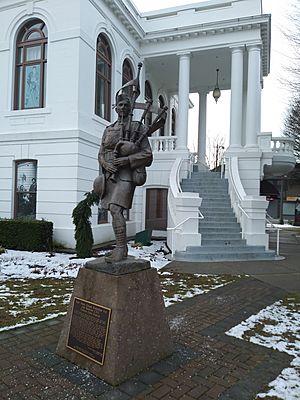Chilliwack Museum and Historical Society facts for kids

James Cleland Richardson statue in front of the Chilliwack Museum and Archives
|
|
| Established | 1958 |
|---|---|
| Location | 45820 Spadina Avenue Chilliwack, British Columbia V2P 4A6 |
| Type | History Museum |
The Chilliwack Museum and Historical Society is a special group that runs the Chilliwack Museum and Archives. It's located in Chilliwack, British Columbia, Canada. This group is a non-profit, meaning they use any money they make to help the museum and archives.
Contents
Where to Find the Museum
The Chilliwack Museum and Historical Society has two main places in downtown Chilliwack. The Chilliwack Museum is at 45820 Spadina Avenue. It's inside the old Chilliwack City Hall building. This building is a National Historic Site of Canada. The museum has many exhibits and spaces for fun history programs.
The Society also has the Chilliwack Archives Research Centre. This center is at Evergreen Hall, located at 9291 Corbould Street. It has special storage rooms that keep old records and items safe. These rooms control the temperature and humidity to protect everything.
History of the Museum
People in Chilliwack first thought about starting a museum in 1956. They wanted it to be a project to celebrate the town's 100th birthday in 1958. Local families whose ancestors were early settlers helped lead this idea. Some of these people included Judge Allan Guinet and Oliver Wells.
Early Beginnings
The first museum in Chilliwack opened in March 1958. It was started by the Chilliwack Historical Society. The city council gave them a room in the police building on Nowell Street North.
In 1960, the museum moved to a room in the local library. Then, in 1971, for another big celebration, the museum moved again. It went into Evergreen Hall and was renamed the Wells Centennial Museum.
Moving to City Hall
In 1981, the Society was allowed to use the old City Hall building on Spadina Avenue. The museum's exhibits and offices moved to this new spot. However, the archives and collections stayed at Evergreen Hall. In 2011, the archives at Evergreen Hall were made even bigger. This doubled the space for storing old records and objects.
In 2013, the archives received a huge gift. It was about 400,000 photos and negatives. These pictures were taken by a local photography business between 1948 and 2006. The museum also offered bus tours during the Chilliwack High School reunion that year.
In 2014, the museum helped with a local history project called the Chilliwack Poppy Project. The museum grounds were also used for a public gathering that year.
What the Museum Does
The Chilliwack Museum and Archives offers many programs all year long. These programs teach about history and culture.
Programs and Exhibitions
- They have programs for school groups from kindergarten to grade 12. These can be held in classrooms or at the museum.
- They offer monthly tours of the Archives.
- The museum has permanent and changing exhibits about Chilliwack's history.
- Their website also has many online exhibits. One important online exhibit is Chilliwack's Chinatowns: A Story of Diversity, Racism and Arson. This exhibit was created in 2019. It is based on a book by Dr. Chad Reimer. The Virtual Museum of Canada hosts this online exhibit.
Collections and Research
The Society collects, protects, and takes care of local historical records and objects. These items are important to the Chilliwack area. They also let researchers and the public look at these collections. You can search for items online using the Chilliwack Museum and Archives database. This database has been online since 2007.
The Museum and Archives also helps people with local research. They publish books about community history. They also give advice and help with other local history and culture projects.
How the Museum is Run
The Chilliwack Museum and Archives is managed by the Chilliwack Museum and Historical Society. This is a registered non-profit group. The Executive Director leads the team. There are four full-time staff members and three part-time staff members. About 20 volunteers also help out.
The Society is part of several important groups. These include the British Columbia Museums Association, the Archives Association of British Columbia, and the Canadian Museums Association. The Chilliwack Museum and Historical Society gets money from the Canadian government, the provincial government, and the city government.
 | James Van Der Zee |
 | Alma Thomas |
 | Ellis Wilson |
 | Margaret Taylor-Burroughs |

